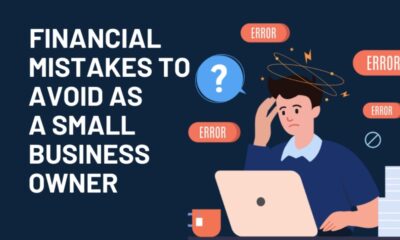Business
Getting Started in Quantitative Finance: Beginner Guide

Financial theory, computer science, and mathematical models are all combined in the dynamic field of quantitative finance—often referred to as quant finance or QF—to analyze and manage financial risks. Knowing where to begin and grasping the fundamentals can be extremely helpful for anyone wishing to pursue a career in this fascinating and fulfilling area. The fundamentals of quantitative finance will be covered in this beginner’s guide, along with helpful tips to get you started.
Understanding Quantitative Finance (QF)
A subfield of finance known as quantitative finance focuses on applying statistical analysis and mathematical models to make well-informed financial decisions. Quantitative analysts (quants) are experts in this field who use their knowledge in a variety of financial activities such as trading, risk management, and investment banking.
Key Concepts in Quantitative Finance
Mathematical Modeling: To assess financial markets and instruments, quantitative finance mainly relies on mathematical models. For quants, it is important to comprehend ideas like linear algebra, calculus, and probability theory.
Statistical Analysis: Quants employ statistical methods to examine past data and spot trends that may be used to forecast future changes in the market. Accurately interpreting financial data requires a solid understanding of statistics.
Programming Skills: Quants must be proficient in languages like Python, R, and MATLAB. Quantitative model development and implementation are frequently carried out using these languages.
Financial Instruments: A deep comprehension of a range of financial instruments, including bonds, stocks, derivatives, and options, is a requirement for quants. To succeed in quantitative finance, one must understand the pricing and trading of these instruments.
How to Begin Using Quantitative Finance
Educational Background: A career in quantitative finance requires an excellent foundation in computer science, statistics, and mathematics. Numerous experts in this domain possess advanced degrees, like a Master’s or Ph.D., from disciplines like finance, physics, or mathematics. To acquire specialized knowledge and abilities pertinent to the field, think about enrolling in a program like the Certificate in Quantitative Finance (CQF).
Develop Your Skills: You can improve your quantitative abilities by enrolling in classes or doing independent study in subjects like statistics, programming, and mathematics. You can develop a solid foundation in these areas by enrolling in a variety of courses offered by online learning environments such as Coursera, edX, and Khan Academy.
Acquire Practical Experience: Entry-level jobs or internships in financial institutions can offer beneficial first-hand knowledge of quantitative finance. Seek out chances to use your skills in practical situations and compile a portfolio of completed projects that can serve as a reference for prospective employers.
Networking: In the financial sector, networking is essential. To network with experts in the field, go to conferences, seminars, and industry events. Developing a strong network of contacts can also be facilitated by joining organizations such as the CFA Institute or the Global Association of Risk Professionals (GARP).
Stay Updated: The field of quantitative finance is always changing, with new methods and tools appearing on a regular basis. Participate in online forums, read trade journals, and attend webinars to stay up to date on the latest developments and trends in the field.
Conclusion
A rewarding and difficult path can lead one into the field of quantitative finance. You may improve your chances of success in this fast-paced industry by developing a solid foundation in math, statistics, and programming, getting real-world experience, and keeping up with the most recent developments. The subject of quantitative finance offers fantastic prospects for development and advancement, regardless of your level of experience or desire to switch careers.
-

 Business3 weeks ago
Business3 weeks agoNayef Doleh Examines International Humanitarian Fundraising Strategies
-

 Business3 weeks ago
Business3 weeks agoHow to fill MSME Form 1? Step-by-Step Guide
-

 Business4 weeks ago
Business4 weeks agoHow Black Banx is Redefining Global Banking Strategies in 2025
-

 Education4 weeks ago
Education4 weeks agoSchool Of Odd Thinkers – Think Odd, Learn a lot, and Earn a lot
-

 Festivals & Events3 weeks ago
Festivals & Events3 weeks agoInteresting Facts about St. Patrick’s Day
-

 Tech4 weeks ago
Tech4 weeks agoMicrosoft Teams to End SMS Messaging Feature Support for Android Phones and Switch to Phone Link App as Alternative
-
Business3 weeks ago
From Marine to Chief: The Leadership Journey of Sean Mannix
-

 Education4 weeks ago
Education4 weeks agoJeffrey Laino Offers a Close Look at Literary Analysis Implementation

























